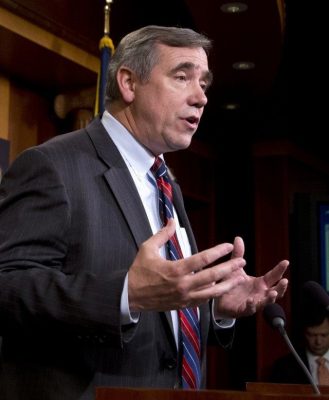Bernie Sanders, Top Progressives Announce New Medicare-For-All Push
Daniel Marans
March 27, 2017
HP says Sanders using “Overton Window” strategy to obtain concessions, not necessarily complete single payer health care
CREDO’s Murshed Zaheed: No to “collaborating with right-wing extremists that control Congress

National Nurses United in Chicago push to tax Wall Street to fund single-payer health care.
WASHINGTON ― In the wake of the Republican failure to repeal the Affordable Care Act on Friday, leading figures in the progressive wing of the Democratic Party are rallying behind a single-payer health insurance and a raft of other bold reforms.
These lawmakers and grassroots leaders have long believed that the problems plaguing the Affordable Care Act, also known as Obamacare, are rooted in the original health care law’s attempt to accommodate, rather than gradually replace, the private, for-profit health insurance system.
Now that efforts to eliminate the law wholesale are effectively dead, they are again arguing that the best way to improve the country’s health care system is to confront the power of corporate health care providers more directly.
“We have got to have the guts to take on the insurance companies and the drug companies and move forward toward a Medicare-for-all, single-payer program,” Sen. Bernie Sanders (I-Vt.) said on MSNBC’s “All In with Chris Hayes” on Friday night. “And I’ll be introducing legislation shortly to do that.”
 Even before the Republicans withdrew their Obamacare repeal bill, Rep. Keith Ellison (D-Minn.), the deputy chair of the Democratic National Committee and a close Sanders ally, previewed this message at a rally in defense of Obamacare on Thursday.
Even before the Republicans withdrew their Obamacare repeal bill, Rep. Keith Ellison (D-Minn.), the deputy chair of the Democratic National Committee and a close Sanders ally, previewed this message at a rally in defense of Obamacare on Thursday.
“Don’t just be satisfied with defeating Trumpcare ― set your sights on creating real Medicare for all!” he told a cheering crowd of hundreds of activists.
Representatives of several major progressive organizations ― the Working Families Party, the Progressive Campaign Change Committee, Credo, Social Security Works and the National Nurses United ― all echoed this push in conversations with The Huffington Post on Friday and Saturday.
“The problem is the insurance companies, Big Pharma ― they’re gonna come back and use the chaos to their advantage,” predicted Social Security Works executive director Alex Lawson. “If Democrats go with a half-a-loaf policy, Republicans are going to blame them for the failures of Big Pharma. They have to immediately pivot to expanding Medicare.”
 Notwithstanding the support of the influential groups for the proposal and ― according to a May 2016 Gallup poll ― even a majority of the American people, Medicare-for-all legislation is a non-starter in the current Congress. Single-payer health insurance still lacks support from many, if not most, Democrats, let alone from the Republican lawmakers who control both chambers.
Notwithstanding the support of the influential groups for the proposal and ― according to a May 2016 Gallup poll ― even a majority of the American people, Medicare-for-all legislation is a non-starter in the current Congress. Single-payer health insurance still lacks support from many, if not most, Democrats, let alone from the Republican lawmakers who control both chambers.
But the proactive strategy speaks to increasing confidence among progressives that if they stick to their ideals and build a grassroots movement around them, they will ultimately move the political spectrum in their direction.
“It does take time for social change,” said Chuck Idelson, communications director of the National Nurses United, a 150,000-person labor union that has long advocated for a single-payer health insurance system. “We didn’t end slavery overnight. It took from Seneca Falls in 1848 ’til 1920 until women won the right to vote. But they only won it by building a movement.”

Overton Window
In the meantime, a potential benefit of this ambitious approach is what’s known as shifting the “Overton Window,” a political science term for the narrow range of acceptable political views at a given moment in time.
By adopting a position that is considered extreme by contemporary standards, politicians and activists can make more attainable policy goals start to seem reasonable by comparison. [VOD: i.e. Sanders et al are not REALLY working to achieve single payer health care at this point, just concessions from corporate health care industry and other politicians.]
That phenomenon already seems to be working in progressives’ favor.
Sen. Jeff Merkley (D-Ore.), the only one of Sanders’ Senate colleagues to endorse his presidential bid, discussed the possibility of lowering the Medicare eligibility age or empowering Medicare to negotiate drug prices in his statement on the Republican bill’s collapse.
“There are plenty of ideas already on the table that would make health care more affordable for working families, from a public option, to prescription drug negotiations, to offering older Americans the chance to buy into Medicare,” Merkley said on Friday. “I’m happy to work with anyone, from either side of the aisle, to explore these or any other ideas that would improve health care for working Americans.”

U.S. Senator Jeff Merkley/AP photo
Lowering the Medicare eligibility age from its current level of 65 is a “very interesting” idea, because of the positive financial effect it would have on the Obamacare insurance exchanges, said Austin Frakt, a health economist for the Department of Veterans Affairs.
By allowing the oldest exchange participants to enroll in Medicare, lowering the Medicare age would relieve the health insurance marketplaces of some of their costliest customers, said Frakt, who also has academic posts at Boston University and Harvard.
“It would reduce the premiums in those markets,” he predicted. (Frakt noted, however, that absent measures to offset the cost of the additional beneficiaries, the change would increase Medicare’s financial burden.)
Social Security Works’ Lawson praised the idea as an incremental step toward Medicare-for-all.
“Start by lowering the age to 62 and get it down to zero,” he said. “If Democrats go with a half-a-loaf policy, Republicans are going to blame them for the failures of Big Pharma.”

Trump meeting with big pharmaceutical companies; he flipped his original position on lowering drug prices.
Another progressive policy gaining mainstream traction is legislation permitting the importation of prescription drugs from Canada, where the existing single-payer system keeps prices lower. Sen. Cory Booker (D-N.J.) was one of several Democratic senators to endure heavy criticism in January for helping block a resolution supporting drug importation. In late February, Booker became a co-sponsor of legislation Sanders introduced that would legalize prescription drug importation from Canada and other countries.
President Donald Trump talked about getting tough with pharmaceutical companies over the price of prescription drugs as recently as early January.
But he has remained silent on the matter since inauguration, including the 17-day period when he was trying to pass House Republicans’ Obamacare repeal bill. What’s more, the ordeal cast serious doubt on his willingness to take on the GOP’s ultraconservatives, who no doubt oppose any form of government intervention to reduce drug prices.
Trump now claims he is counting on Democrats to negotiate over Obamacare on his terms, since, in his telling, the law is on the brink of collapse .
Obamacare’s insurance exchange markets have major problems in some states and regions, but the nonpartisan Congressional Budget Office characterized them as stable overall.

Mushed Zaheed of Credo and Netroots Nation
Still, Senate Minority Leader Chuck Schumer (D-N.Y.) suggested in a CNN interview on Friday night that Democrats would be open to working with Trump and congressional Republicans on reforming the law.
“We’re not gloating that they failed. We’re sad that they won’t work with us to improve Obamacare,” he said.
Murshed Zaheed, political director of Credo, warned Democratic leaders that any Democratic efforts to work with Republicans would not get any help from grassroots groups like his.
“If Democrats want to push their version of so-called moderate proposals ― good luck to them,” Zaheed said. “I don’t think anybody should be under any illusion that Schumer or [House Minority Leader Nancy] Pelosi will get anything from collaborating with the right-wing extremists that control Congress.”

Massive march for single-payer health care, kick out insurance companies
Open Letter to Delegates Attending the National Single Payer Strategy Conference in New York City
“Let’s Fight For What We Need: Medicare For All”–not “Obamacare”
Jannuary 13, 2017
Dear Sisters and Brothers:
The Call for the National Single Payer Strategy Conference begins with an affirmation with which we agree wholeheartedly:
“We believe that a powerful resistance movement anchored in the labor and social movements can turn the tables on Trump and all that he represents. To win, we must inspire Americans to fight for what they need, not what the political establishment tells them they can get.”
 And what they need is Single Payer, now! The American people support Single Payer (or Medicare For All) overwhelmingly. The Bernie Sanders campaign made Single Payer a household term; his call for it galvanized young people and workers from coast to coast.
And what they need is Single Payer, now! The American people support Single Payer (or Medicare For All) overwhelmingly. The Bernie Sanders campaign made Single Payer a household term; his call for it galvanized young people and workers from coast to coast.
With the Affordable Care Act now under attack by the incoming Trump administration, a wing of the establishment — the corporate Democrats — are telling us to hold our horses on Single Payer and focus on the defense of ACA. Many are the same people who told us that Single Payer could not be included in the Democratic Party platform or raised during the final months of the presidential campaign. (A San Francisco Bay Area nurse who appeared before the DNC Platform Committee to argue for Single Payer told a San Francisco report-back forum she felt like she was “crashing the Democratic Party’s country club party.”)
Yes, we must defend the gains contained in the Affordable Care Act (ACA), but we cannot and must not defend ACA as such. Nor should we put the ACA on the same level as Medicare and Medicaid, two historic gains.

Labor economist Dr. Jack Rasmus
The ACA was a law written by insurance industry lobbyists and representatives of other price-gougers in healthcare. Under ACA, hundreds of billions of dollars meant for the care of patients are siphoned off as profits for the big healthcare insurance companies — money that would be saved by their elimination from the system. This money could be used to ensure quality and comprehensive coverage for all residents.
The ACA’s flaws are fundamental: rising premiums (which are scheduled to spike big time in 2017), rising deductibles, rising co-pays, tens of millions still without coverage, exclusion of undocumented immigrants, bloated and wasteful administrative costs, growing problems in collective bargaining in negotiating good benefits programs, etc.
Labor economist Jack Rasmus summed it up well:
“In his farewell address, President Obama touted the fact that on his watch, 20 million of the 50 million uninsured got health insurance coverage, half of them covered by Medicaid, which provides less than even ‘bare bones’ care, assuming one can even find a doctor willing to provide medical services. The rest covered by ACA mostly got high deductible insurance, often at an out-of-pocket cost of $2,000 to $4,000 per year. Thus, millions got minimal coverage while the health insurance industry got $900 billion a year. . . .
“In the wake of ACA’s passage, big pharmaceutical companies have also been allowed to price gouge at will, driving up not only private health insurance premiums but Medicare costs as well, and softening up the latter program for coming Republican-Trump attacks.”
Indeed, the Democrats’ failure to campaign for Single Payer played right into Trump’s hands. This was best explained by Jack Kingston, a Republican former member of Congress from Georgia:
“One of the reasons that Hillary Clinton lost the election is the widespread anger in the Rust Belt and other regions over the rising costs of healthcare under Obamacare. It might not be a top media story, but it is certainly a discussion at the dinner tables in working-class and middle-class households across the country. Everyone is concerned that premiums and healthcare costs are going to soar in 2017 under Obamacare. Trump said that Obamacare has to go, and he got a real hearing.” (from interview on PBS at the Republican election-night gathering)
At a time when the national discussion is heating up around the question of what the ACA should be replaced with, the labor movement needs to go on the offensive with the call to replace ACA with Medicare For All. This, in fact, is the best way to defend and expand the gains contained in ACA. It is the only real solution!
To focus, as the Democrats are urging labor to do, on defense of ACA is a losing proposition. To win, we must inspire Americans to fight for what they need, not what the political establishment tells them they can get — and that includes the Democratic Party wing of the establishment.
It is time to break with this “lesser-evil” approach to politics. It is time for labor to assert its independent voice. It is time for the labor movement to break with its ties of subordination to the Democratic Party and launch a full-scale offensive to demand: Single Payer Now!
This is the message, we believe, that needs to come out of the National Single Payer Strategy Conference.
Issued by the Labor Fightback Network. For more information, please call 973-975-9704 or email conference@laborfightback.org or write Labor Fightback Network, P.O. Box 187, Flanders, NJ 07836 or visit our website at laborfightback.org. Facebook link https://www.facebook.com/laborfightback.




